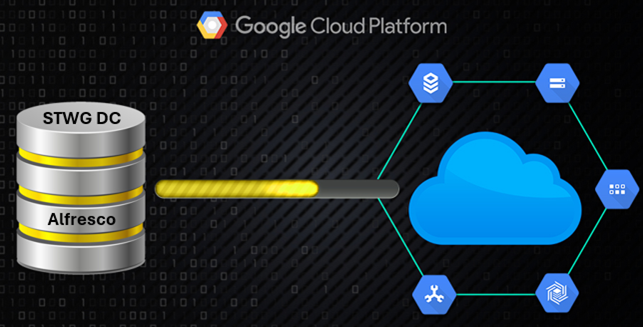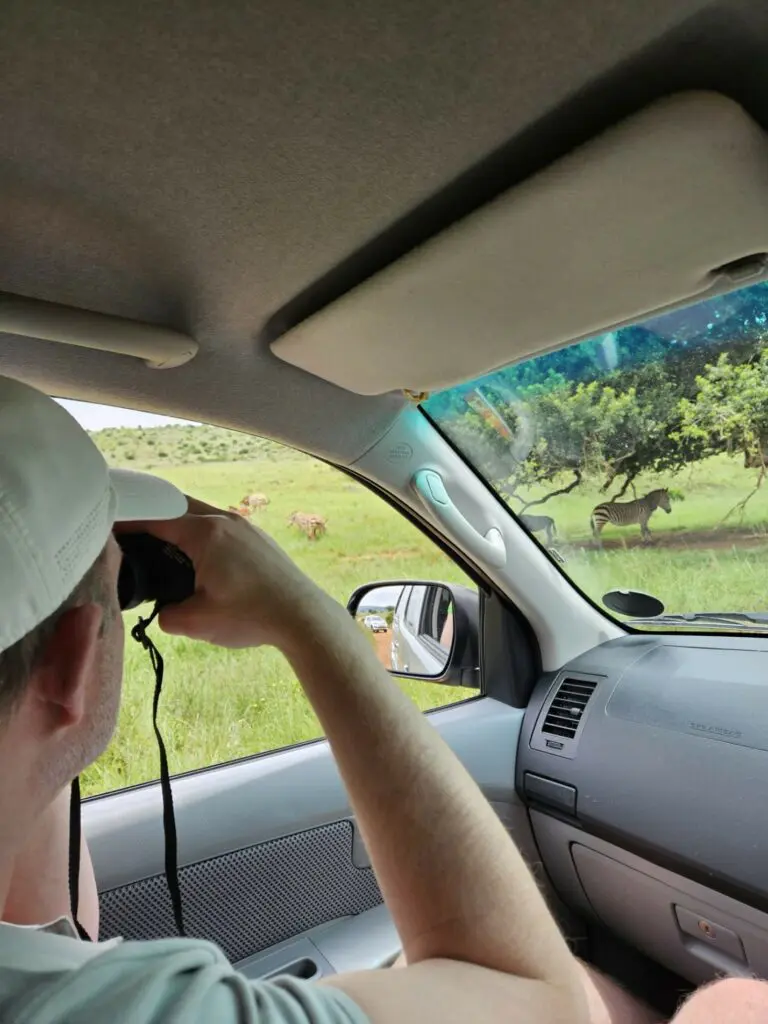Vertrouwensketen (Chain of Trust)
So now and then, we get a compliment for the work and effort we did, and when that happens, we need to share this, of course. For a couple of years, Steinweg has been actively involved with internal colleagues and external parties in the supply chain on the “vertrouwensketen”, focused on making the container process safer to prevent, for example, pincode fraud. Niels van Loenen and team Gold changed the applicable systems to support this, which was favorable as the police and customs authorities confirmed a severe decrease of 85% in pincode frauds due to the “vertrouwensketen”.
The Alfresco cloud migration rollercoaster – three times is a charm
People involved in the project:
Incentro engineer: Angel Mesones
Steinweg: Luis Lopes, Rene de Roos, Telmo Parreira, Pedro de Sousa, Raymond Chang
Testers: Nick Struijlaard, Bart Weiland, Bjorn Oomen, Bouke Dambrink
PM: Frans Vervuurt
End of September 2023, Michel Karsdorp asked me to look into the Alfresco cloud migration project, as it needed to move forward.

First attempt
The test version was migrated to the Google Cloud Platform (GCP) shortly before. This migration showed that the transfer rate from the on-prem system to the GCP was far too low to migrate the huge PRD databases on the weekend. Therefore, a 10 Gb/s connection was configured by Janius Isenia (Infra team), and tests were performed, still showing a low transfer rate. Several tests, checks and tweaks were done, and towards the end of October 2023, eventually, the speed was at an acceptable rate. An alternative route was found for the transfer of the SQL database, so that problem seemed resolved.
We scheduled and prepared for the migration in the weekend of 3-5 November. All terminals, stevedoring and Baltimore approved, and users of the 11 Alfresco applications were informed through an intranet announcement. Bart, Bouke, Bjorn, and Nick were lined up for testing on Sunday, so we were ready to GO.
Optimistically, Luis, Rene, Angel and I started on Friday evening after 22:00CET. We began according to the runbook: file transfer was running, the SQL database backup was available in the cloud, and processing started. Then, at around 01:30, the transfer and processing were struck by bad luck….. It turned out that a Google Cloud issue stopped the Kubernetes engine, which was required for the transfer and processing. After 2 days of checking and without Google support (only basic Google support was arranged, which is effectively no support), it was not resolved that weekend and not even in the weeks after (indeed, an issue in the Google cloud for several weeks). So we had to roll back on Sunday and perform tests. We were finished by 21:00.
It was a long weekend with effort and stress, without any result.
Second attempt
We had to wait for the 2nd attempt until the weekend of 15-17 December. Again, all preparations were done, and testers Bart, Bouke, and Bjorn were lined up.
Once more optimistic, Rene, Telmo, Pedro, Angel and I started the migration at 22:00 CET on Friday evening. File transfer and database backup processing went fine. The Alfresco system in the cloud was configured and checked. We saw documents in the application, so it was progressing well. Meanwhile, Rene prepared the on-prem database for roll-back, just in case. When Alfresco started on Saturday, also the indexing of the data began, and when that would finish, testing could start on Sunday morning as scheduled. Then, indexing took longer than expected. Indexing was still running on Sunday afternoon (although extra cloud resources were added before this migration started to increase the speed), so maybe testing in the evening. But indexing was still ongoing in the evening, so I asked our testers if they could test in the early Monday morning around 5:30 (and they were willing to do so).
In the early morning, indexing was still running and the progress was slow. We decided to roll back at 6:15.
After an extremely long weekend, we were back to zero.
We left the indexing running until it finished at 17:15 on Monday afternoon.
Third attempt
We discussed alternative migration options. Angel explained that differential indexing is possible: add indexes on top of already available indexes. So, we tested this scenario with the finalized migration and addition of new data a few weeks later, at the beginning of January. This worked almost perfectly: a lot of the new data was not indexed. We found a workaround: provide references of the newly added files and perform indexing of those. Then it seemed OK 😊.
Then we scheduled the 3rd attempt during the weekend of 9-11 February.
First, we performed a full migration the week before to create the complete index of all files in Alfresco. Rene generated a full backup on Sunday evening, 4 February. Angel started the file transfer on Monday morning, as well as the processing of the backup. On Tuesday, the system was up and running in the cloud, and indexing started. Friday, 9 February at 12:45, indexing finished after almost 53 hours. This was just in time to prepare for the live migration.
All preparations (terminals, stevedoring, Baltimore, and users) were done for the migration starting Friday evening, 9 February, at 23:00 CET. Bart, Bouke, Bjorn and Nick were arranged again for testing on Sunday morning.
Rene, Telmo, Angel and I started the migration at 23:00. File transfer and database backup processing went well. The differential indexing started on Saturday afternoon at 15:55 and including the extra indexing of missing references, this was done at 17:55.
We were at the point where we could finally perform some checks with a complete Alfresco system in the cloud. And those checks were positive. At 20:00, we concluded the day with a positive feeling about the migration; it was ready for testing.
In the morning, Telmo, Bjorn, Nick, Bart and Bouke performed some actions in systems that use Alfresco, like General, iCorp, Basware, Solar and Fiton. All results were positive, so I could send the DONE mail with the good news to the stakeholders.
At 11:00, I wrapped up and closed my laptop, this time with a good feeling about the achieved migration.
Of course, the proof of the pudding is on Monday morning when the terminals start their daily activities. So, at 07:00, Angel, Telmo and myself were sitting at our laptops, ready to tackle any issues. But ……. it remained silent, very silent the entire morning and afternoon and the days after.
It was a challenge, a test, a voyage of discovery. As a result of our persistence, the migration was successfully done.
What is the impact on our Data Center?
As Alfresco is now running in the Google cloud, we started the decommissioning procedure for the servers and storage used by the on-prem version. This implies the release of:
- The SQL database of appr. 600GB and the transaction log of 150GB, so in total around 750GB.
- The fileserver (nl-alf-fs01p) of appr. 3TB
- The application servers (nl-alf-as01p/02p/03p/04p, nl-alf-as01t/02t/03t/04t/05t), each 130GB, totaling approximately 1.17 TB.
Overall, appr. 4.92 TB will be released and will be available for other applications.
Thanks a lot guys, for your support and commitment,
Frans Vervuurt
Bits, Bites and Braai – Catching up with our South African colleagues
Jörgen Busink, Stephan Steenkamp, and Michel Karsdorp visited our Southern African colleagues towards the end of January as a follow-up to Michel’s visit a few months prior.
The main goal of the visit was to better align IT strategies and roadmaps between the two teams. South Africa IT colleagues also traveled from Durban to join us for the sessions held in Johannesburg.
We had a week of very intense sessions, and among the topics discussed were:
- IT Infrastructure roadmaps for Africa and Group IT
- Zscaler and Aryaka
- Azure Active Directory (AAD) trust between domains
- Single Azure tenant between the two entities
- End User Computing
- Global Microsoft Enterprise Agreement
- Information Security
- Resourcing and how this forms part of Group IT
- Vendor Management
- ServiceNow
- Middleware (Tibco), test management and test automation (Tosca, Qtest) and our Development Platform (Outsystems)
- Project Management dashboards / Confluence / Jira
- Strategic Portfolio Management
- SAP C4C
- and many, many more
Michel also joined a three-day 4PL workshop with business colleagues from South Africa, where they discussed and explored the possibilities of 4PL logistics.
So many discussions were held, and it isn’t easy to summarize them all. If you weren’t part of these sessions and are curious about what was discussed, please reach out to the three of us, and we will happily give you some insight into what we discussed.
With all of the hard work, there were luckily a few hours on Saturday for Stephan to take Michel for a quick African Safari, and they managed to see many South African animals, including some of the big 5.

Progress Report on Infrastructure Projects
Email Migration
As per the previous update regarding replacing our old mail servers, many projects are underway that will ultimately improve the experience of our end users.
- Front-end (Mimecast): The implementation and design work of Mimecast is underway. Ashley (NL) and Dexter (SA) are working with Mimecast to ensure our new email security solution will secure us from all known and unknown email-based threats and that it will be simple to manage going forward.
- Back-end (Exchange Online): The server configuration for our exchange online is completed. The Infrastructure team is currently busy configuring the load balancers and doing the network configuration.
- Archiving (Exchange Online Archive): Moosa and Mirah (SG) and others in the Singapore team have started moving old emails from Mailstore into the Exchange Online Archive. The archive migrations are around 50% completed in Asia and 20% in the Netherlands, and will continue for the next few weeks. Once completed, everyone will have an archive folder integrated into their Outlook, which can be used to access older emails easily.
Desktop Environment Netherlands
- Thin Client Replacement: The thin client deployments have been completed for all Netherlands users. A big thanks to Jennifer (PM) and the contractors for getting this done ahead of schedule! These thin clients enable users to host and join Teams Meetings via Horizon.
- Office 365: The Office 365 rollout in the Netherlands is about 75% completed and will be finished towards the beginning of March.
zScaler
Due to the recent events regarding our FortiVPN on February 9th, we were forced to accelerate the zScaler software client deployment in the Netherlands and other locations. Multiple users had already been deployed onto zScaler. Still, with the help of the service desk over the weekend and on Monday morning, we managed to accelerate the rollout and onboard many more users onto the platform. There are about 200 users left to deploy in the Netherlands. They will be provisioned in the next few weeks.
Meanwhile the zScaler deployment in the rest of the world has nearly concluded. Thanks to the great efforts of the project team we have completed the onboarding of 24 offices in Asia and have nearly finished the project at 6 offices in Latin America and several more in the Middle East and Europe. About 600 end-users are now regularly using zScaler on a daily basis.
From Erick’s Desk
I’d like to revisit an update I shared during our recent Global Team Quarterly Session: We’ve taken a crucial step forward by consolidating and centralizing our IT personnel. This initiative unites our African IT teams under a cohesive structure, positioning us to drive innovation and excellence throughout the organization.
While our IT teams maintain their valued on-the-ground support within their respective business units, there’s a significant shift in their reporting structure as they now report directly to me. This isn’t just a structural change; it’s a tangible move away from having IT operate in divisional silo’s and is notably aligned with our Global strategy of positioning IT as a strategic partner and enabler for the business. Our more focused approach will help us to drive our team’s mission: to revolutionize the C Steinweg Bridge Group business by leveraging technology solutions that automate processes and deliver innovation. AI is our priority… with a little twist:
- Automation Acceleration: Streamlining business processes through automation and integration both internally and with our customers. BridgeConnect is an example of a group-wide initiative meant to drive efficiencies through automation and process improvement in a standardized way across our group businesses.
- Innovation Initiatives: Innovation drives progress, and we will be working on creating and nurturing a culture that fosters fresh ideas. We will strive to find innovative ways to evolve our services and deliver service excellence, by continuing intentional engagement with our business stakeholders to understand their requirements to be able to drive innovative solution responses.
BridgeConnect: Connecting Our World, One Shipment at a Time!
The BridgeConnect system isn’t just a technological advancement; it’s a solution set to revolutionize our Imports operations by providing a unified and streamlined view of the entire process throughout the shipping lifecycle.
Looking back at the strides made in 2023, our teams rolled out the BridgeConnect system for the Africa Export Teams across South Africa, Zambia, Zimbabwe, and Mauritius. In 2024, the momentum continues as we kick off planning for the system’s rollout in Mozambique during Q1, as well as gearing up for a rapid and comprehensive rollout in Malawi, Kenya, Tanzania, Uganda, and the Democratic Republic of Congo (DRC) for the remainder of the year. The phased approach adopted ensures that the BridgeConnect system seamlessly aligns with the specific requirements of each region to support a positive and efficient end-user experience.
2023 Stats: BridgeConnect By Numbers
- Projects Created: 4308
- Inbound Cargo Movements: 3201
- Outbound Cargo movements: 1893
- Number of people onboarded: 397
- Invoices Raised: 6726
- Supplier Invoices Received: 28649
Unlocking Profitability with C. Steinweg’s Intuitive Tools
In our commitment to driving customer centricity through what we do, C. Steinweg’s Profitability and Billing Tools stand out as key enablers in unlocking profitability. These intuitive solutions offer insights and analytics that delve into the financial intricacies of our operations to enable informed decision-making. Let’s explore some of the key features:
- Process Automation:
- Benefit: Automation of manual tasks, such as tracking shipping file balances, reduces reliance on Excel spreadsheets.
- Impact: Teams save time, minimize errors, and enhance overall workflow efficiency. Automation allows a shift in focus towards more strategic aspects of responsibilities.
*Interesting Stat: A study by Deloitte revealed that companies embracing process automation in shipping operations witnessed a 20% reduction in operational errors and up to a staggering 95% increase in overall productivity.
- Revenue Maximization:
- Benefit: Comprehensive insights into revenue generated from different services, routes, or customers.
- Impact: Teams can zero in on high-revenue opportunities, stay ahead of unpaid/ overdue invoices, and ultimately maximize the company’s overall revenue collection.
- Integration with ERP Systems:
- Benefit: Seamless integration with internal systems (CargoWise, BOS, BridgeConnect, and CarLo) provides a holistic view of financial data and facilitates streamlined operations.
- Impact: Where we previously could not provide a connected view of billing and profitability information, we now have full visibility of this data across our internal systems.
- Interesting Stat: Companies with integrated ERP systems achieve 30% faster decision-making processes, as highlighted in a recent survey conducted by ResearchGate.
In short, these tools have been rolled out and will empower Controllers, Commercial Teams, and other Stakeholders in their day-to-day responsibilities. They offer actionable insights that directly contribute to success and enhance overall financial health. As industry dynamics continue to shift and evolve, the imperative of innovating and implementing cutting-edge solutions becomes paramount for sustained growth and competitiveness within our space.
Optimizing Operations with CargoWise: A Snapshot of Efficiency
CargoWise is a comprehensive software solution designed to streamline and enhance the efficiency of our Import operations, making it an integral part of modern logistics management. From automating workflows to providing real-time visibility into shipments, the platform optimizes the entire logistics process for our Africa: Imports Teams.
2023 Stats: CargoWise By Numbers
- Shipments: 8207
- Brokerage Jobs: 17236
- Warehouse Inbound Jobs: 23180
- Warehouse Outbound Jobs: 68128
This is just a snapshot of the platform’s impact on our Imports Operations, showcasing the significant volume of transactions and tasks efficiently managed through CargoWise. With its emphasis on automation, real-time visibility, and centralized data management, the platform aligns with our commitment to operational excellence.
Succesful ServiceNow Implementation – Oman starts using ServiceNow
I’m pleased to announce that our implementation of the ServiceNow platform in Oman has succeeded!
Over the past months, our team has been hard at work integrating ServiceNow for Oman IT and business operations, and we are delighted to see the results of our efforts.
The successful implementation of ServiceNow was only possible with the dedication and collaborative spirit of both teams (ServiceNow and Oman IT Support / Business Application Team).
Everyone was crucial in ensuring a smooth transition to the new platform. We are incredibly grateful for your hard work, flexibility, and enthusiasm throughout this process. This means smoother processes, better collaboration, and happy end-users!
With ServiceNow, now fully operational in Oman, we are ready to realize the platform’s many benefits. From automated workflows to streamlined service delivery, ServiceNow will enable us to work more efficiently and effectively than ever before.
As we move forward, let us continue to embrace innovation and explore new opportunities to leverage the capabilities of ServiceNow.
Once again, thank you to everyone involved for your dedication and commitment to our shared goals. Your efforts have made a difference, and we look forward to continuing this journey of growth and success together.
Evans Boadi
Product Owner | ServiceNow
